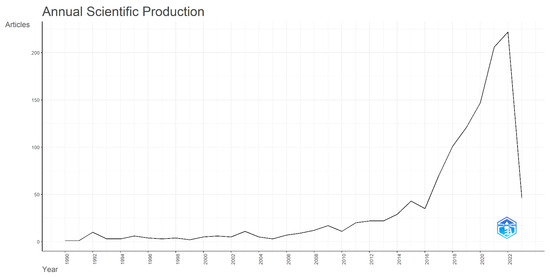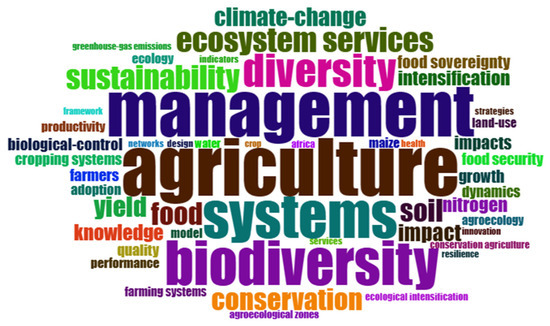Abstract
Conventional agricultural techniques cannot fulfill the requirements of a sustainable food value chain. Agroecology can be a great alternative practice for transforming the current agricultural systems. This approach combines ecology and agriculture, considering different stakeholders’ opinions. An assessment of the current literature about “agroecology practices” using the Web of Science database was made, and 1235 results were collected and unified into a bibtex file using R studio. The final results were extracted through the bibliometix library. The acquired results show that annual scientific production on the aforementioned term was limited between the 1990s and 2010s and has recently increased due to increased interest in the topic. Additionally, the terms “agriculture”, “management biodiversity”, and “conservation” are frequently correlated with agroecology, covering all three dimensions of sustainability. Agroecology as a trending topic has great potential to serve North African countries, increasing food security levels while assuring sustainability standards.
1. Introduction
Conventional agricultural management techniques focus on monoculture, heavy use of mechanized production, genetic manipulation, and mass production. However, these techniques do not provide feasible solutions to the current needs of sustainable food value chains, especially for countries with lower incomes [1]. It is essential for actions to be taken in this regard, as small farmers are the most affected and they usually have traditional farming systems [2]. A new perspective is needed for a transformation in the agricultural systems, in order to deal with food security and environmental issues, as well as diminishing the gap between small and large farmers in terms of yield and eco-friendliness.
Agroecology can be defined as the combination of agriculture and ecology. According to FAO (2020) [3], it is a holistic approach that covers ecological and social aspects in order to create and manage agricultural and food systems in a sustainable way. Agroecology involves various stakeholders utilizing inter-disciplinary methods that promote accountable and transparent resource governance. Implementation of agroecological techniques has a positive impact on seven Sustainable Development Goals: 2—zero hunger; 1—poverty alleviation; 13—climate change resilience; 15—biodiversity; 8—youth engagement; 5—gender determination; 10—human rights.
North African (NA) countries are less resilient to climate change due to their location, low technological level, and their lack of knowledge about the implementation of agroecological practices [4]. The NATAE project involves five NA countries, namely Tunisia, Morocco, Algeria, Egypt, and Mauritania, which are facing water scarcity problems as well as food safety issues. Water is a crucial source for the agricultural sector as irrigation is a key factor for food production. Due to this problem, small farmers’ production is affected, as it is highly dependent on extreme weather events [5]. Considering that consumer standards have increased all around the globe, it is of paramount importance for these countries to produce agricultural products that fulfill all sustainability dimensions (economy, environment, and society). This can be achieved by implementing new approaches based on agroecological practices [6].
Furthermore, agroecology is a multidimensional approach that considers different stakeholders’ opinions, and that is the reason why five different living labs in total have been set up in order to record their opinions and deliver their needs for the overall optimization process. A part of the NATAE project will evaluate the differences between the conventional and agroecology practices for the NA countries in local value chains. However, it is considered appropriate to highlight the main results of the existing literature in order to identify the existing gaps prior to the implementation of agroecological practices.
2. Methodology
In order to extract the literature review results, an assessment of Web of Science results was performed, regarding the existence of the term “Agroecology practices” in abstracts, titles, and keywords, which led to the extraction of the main factors influencing the dynamics of the field. More precisely, partnerships and trending topics were assessed, and 1235 results were collected through the web of science database. After this stage, results were transformed into a unified Bibtex file, as the web of science database permits the extraction of only 500 results at the time. The unification process has been achieved through the R studio program and the use of R version 4.2.3. Moreover, the bibliometrix library was used to extract the figures and data to be analyzed.
3. Results and Discussion
The acquired results of the literature review analysis include the following: (1) annual scientific production; (2) most relevant authors; (3) most relevant affiliations; (4) most frequently used terms; (5) most relevant resources; (6) source production over time; (7) affiliation production over time; (8) most cited countries; (9) co-citations network; (10) collaboration network; (11) conceptual structure map; (12) dendrogram. However, due to the limitations of this abstract, only two titles will be discussed below.
Agroecology is a new sector of agriculture that started to be considered in the late 1980s and early 1990s as a solution and method to be applied on industrialized food systems and the sustainability social movement. It came as a solution to climate change and its consequences, particularly food security and the environmental risks [1,4]. As seen in Figure 1 below, scientific publications on agricultural practices were low and stagnant between the 1990s and 2010s. With the rise in the concept of food sovereignty in the 1990s, agroecological approaches gained attention. However, literature regarding agroecological transition is considered limited; thus, a slight increase in scientific production has been recorded lately [7]. More precisely, a significant increase can be observed after 2016, reflecting the high interest in agroecological practices facing climate change and food security issues.

Figure 1.
Annual scientific production trend.
In Figure 2, the most frequently used terms emphasize the significance of the terms and keywords used in publications related to agroecological practices. The terms most abundantly used include management, agriculture, systems, and biodiversity as the focal heart of agroecology. Ecosystem services, diversity, sustainability, conservation, food, and soil impact are the second most important cluster of terms. The combination of these terms reflects how agroecology covers different dimensions, not only environment and agriculture. Akakpo et al. (2021) [4] have highlighted that agroecology is a necessary agricultural model that is capable of mitigating the effects of climate change, conserving biodiversity, securing sustainable food production, and preserving local ecosystems while valorizing them.

Figure 2.
Representation of the most frequent terms.
4. Conclusions
Agroecology is part of a transformative trajectory towards a more sustainable food supply chain covering economic, social, and environmental aspects. Through this approach, feasible solutions can be provided tackling food security issues for the NA countries. The aforementioned literature review highlighted that agroecology is a trending topic with significant potential for NA countries.
Author Contributions
Conceptualization, G.K. and L.S.K.; methodology, G.V.; software, L.S.K. and M.V.; validation, C.K. and M.V.; formal analysis, L.S.K. and C.K.; investigation, M.V.; resources, M.V.; data curation, M.V.; writing—original draft preparation, M.H.; writing—review and editing, M.H. and L.S.K.; visualization, L.S.K.; supervision, G.V. and G.K.; project administration, C.K.; funding acquisition, G.V. and G.K. All authors have read and agreed to the published version of the manuscript.
Funding
This project has received funding from the European Union’s HE research and innovation program under grant agreement No 101084647 and official acronym NATAE. Views and opinions expressed are, however, those of the authors only and do not necessarily reflect those of the European Union or the European Research Executive Agency (REA). Neither the European Union nor the granting authority can be held responsible for any use of the information contained in the document.
Institutional Review Board Statement
Not applicable.
Informed Consent Statement
Not applicable.
Data Availability Statement
All data used for this study are widely accessible, through Web of Science, by searching “Agroecology practices” as described in the Methodology section.
Conflicts of Interest
The authors declare no conflicts of interest.
References
- Amoak, D.; Luginaah, I.; McBean, G. Climate Change, Food Security, and Health: Harnessing Agroecology to Build Climate-Resilient Communities. Sustainability 2022, 14, 13954. [Google Scholar] [CrossRef]
- Vasileiou, M.; Kyrgiakos, L.S.; Kleisiari, C.; Kleftodimos, G.; Vlontzos, G.; Belhouchette, H.; Pardalos, P.M. Transforming Weed Management in Sustainable Agriculture with Artificial Intelligence: A Systematic Literature Review towards Weed Identification and Deep Learning. Crop Prot. 2024, 176, 106522. [Google Scholar] [CrossRef]
- FAO Overview|Agroecology Knowledge Hub|Food and Agriculture Organization of the United Nations. Available online: https://www.fao.org/agroecology/overview/en/ (accessed on 5 June 2023).
- Akakpo, K.; Bouarfa, S.; Benoît, M.; Leauthaud, C. Challenging Agroecology through the Characterization of Farming Practices’ Diversity in Mediterranean Irrigated Areas. Eur. J. Agron. 2021, 128, 126284. [Google Scholar] [CrossRef]
- Fusco, G. Climate Change and Food Security in the Northern and Eastern African Regions: A Panel Data Analysis. Sustainability 2022, 14, 12664. [Google Scholar] [CrossRef]
- Francis, C.A.; Wezel, A. Agroecology and Agricultural Change. In International Encyclopedia of the Social & Behavioral Sciences, 2nd ed.; Elsevier: Amsterdam, The Netherlands, 2015; pp. 484–487. [Google Scholar] [CrossRef]
- López-García, D.; Cuéllar-Padilla, M.; de Azevedo Olival, A.; Laranjeira, N.P.; Méndez, V.E.; Peredo y Parada, S.; Barbosa, C.A.; Barrera Salas, C.; Caswell, M.; Cohen, R.; et al. Building Agroecology with People. Challenges of Participatory Methods to Deepen on the Agroecological Transition in Different Contexts. J. Rural Stud. 2021, 83, 257–267. [Google Scholar] [CrossRef]
Disclaimer/Publisher’s Note: The statements, opinions and data contained in all publications are solely those of the individual author(s) and contributor(s) and not of MDPI and/or the editor(s). MDPI and/or the editor(s) disclaim responsibility for any injury to people or property resulting from any ideas, methods, instructions or products referred to in the content. |
© 2024 by the authors. Licensee MDPI, Basel, Switzerland. This article is an open access article distributed under the terms and conditions of the Creative Commons Attribution (CC BY) license (https://creativecommons.org/licenses/by/4.0/).